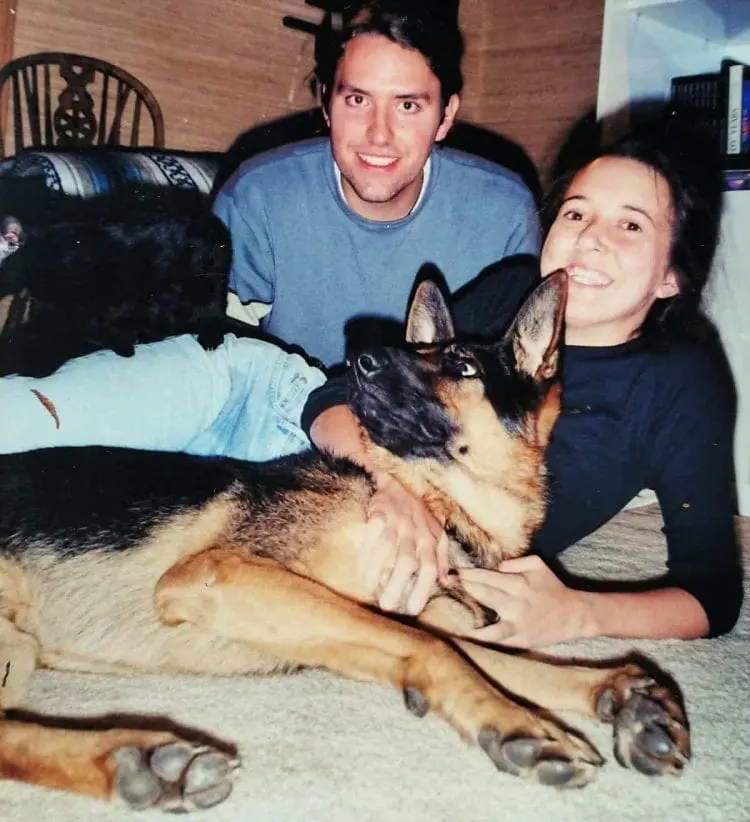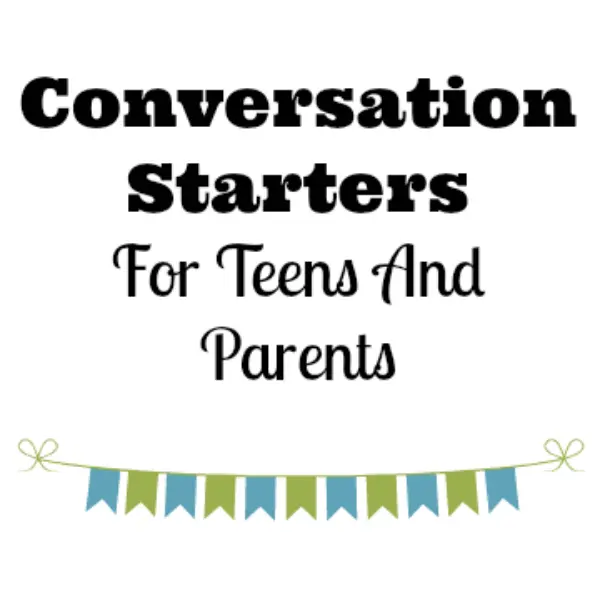Talking to teens about relationships can feel a bit weird. Talking to your teen about sex can feel even more awkward. However, having open conversations with our children is so important to supporting them emotionally and to keeping them safe. Conversation starters are questions or topics used to initiate a conversation or keep it going. They are designed to be open-ended and engaging, helping people connect and find common ground. Today, I am happy to share some really great conversation starters for teens and parents from renowned child psychologist Dr. Jillian Roberts. They are a great way to talk to your teen about dating. You can even use these to segue into conversations around sex so you can share your family’s values and expectations. The right questions can take you from small talk to a meaningful conversation.
Icebreaker Conversation Starters For Parents And Teens
Dr. Jillian Roberts is the perfect expert to share conversation starters for teens and parents because she has just authored a new book, Kids, Sex & Screens (affiliate link). Her book explains what exactly the psychological effects of internet exposure can look like. She then offers parents tools and advice on how to handle this appropriately. If you are wondering, “What are good conversation starters?” Dr. Roberts has lots of great suggestions below. Remember, the best conversation starters are always open-ended questions. When you listen to the answers with a curious heart, it will likely be a great opportunity to use follow-up questions. Active listening shows you care.
Excerpted from the book Kids, Sex & Screens. Copyright © 2019 Quarto Publishing Group USA Inc. Text © 2019 Jillian Roberts, PhD. Printed with permission by Fair Winds Press, an imprint of The Quarto Group.
General Ice Breaker Questions
A chat about one thing can often lead to a discussion of something else entirely. If you have a plan to segue a conversation in a certain direction, your digression can seem off the cuff and less like a lecture or a rehearsed speech. This tactic allows your message to sink in without triggering the usual defense mechanisms a tween or teen may put up.
Start With Simple Questions
Ease in to the conversation by asking questions about your child’s day, just as you may typically do:
- “Who did you connect with today?”
- “Did you have an aha moment this week?”
- “What’s something you’ve never told me before?”
- “Tell me something that’s going on in your world that you don’t think I know about.”
Ask Follow Up Questions
Parents who ask kids questions need to really listen to the answers. Follow up on any tidbits of information they share. You’ll want to tailor your continued conversation to your child’s specific responses. Here are some general ideas for following up on each of my proposed icebreakers:
- “That’s nice that you met a new friend. If you want to invite your friend to come over this weekend, let me know.”
- “Ooh, that’s a pretty big aha. How is that going to change how you do things from now on?”
- “I’m glad you told me that, it’s important for me to know what’s going on with you so I can help when you have questions.”
- “Well, you might think I don’t know anything about that. Maybe you’ll be surprised when I tell you that I did know and was just giving you some space to think about it.”
Dive Deeper Later
Each of these responses may lead to a larger conversation. Keeping the lines of communication open between yourself and your child sets the stage for good communication throughout her adolescence. Of course, if your child tires of sharing the details of her life, as tweens and teens sometimes do, save your questions and bring them up at another time. Following up later could also be a good way to bring your spouse or another family member into the conversation.
- “The other day you mentioned a friend’s name I hadn’t heard before. How did you meet Ryan?”
- “You know, you had that aha moment last week. Are you keeping it in mind as you focus on what’s coming up?”
- “I thought a little more about what you said yesterday and wanted you to know something else. . . ”
- “Remember when you said you didn’t think I knew anything about [insert topic]? I was talking with [spouse] about it, and s/he wanted to talk with you about it too.”
Relationship Conversation Starters
Another way to set the stage for open discussion is to start casual conversations about healthy relationships. Yes, it can get awkward. That’s part of talking about tricky subjects, and the sooner you accept that it’s going to be a little awkward, the sooner you can push past it.

Use A Personal Story To Open The Romantic Relationship Conversation
The car is a great place to have these conversations because you’re both looking forward rather than at each other, making the moment less intense. You’re also trapped together for a little while, so there are fewer distractions than there might be in another setting. You can start a conversation with a story about yourself. For example:
- “You know, I’m not sure you’ve ever heard the real story about how I fell in love with your mom/dad… “
- “I was thinking today about my first crush, and that I was about your age when it happened…”
- “Last night, Grandpa said he ran into one of my old flames from back home, and it got me thinking about the time when…”
- “That song always reminds me of one of my good friends because…”
Sharing stories like these can bring you and your child closer together. It is also a way to model the kinds of decisions about relationships and love that you want to encourage without sounding like you are lecturing.
Words Of Caution
Make sure you’re sharing a story to be helpful. If you’re estranged from your child’s other parent, don’t use this time to try to sway your child to your side of a dispute. If you have any past trauma in your life, try not to burden your child with details beyond her age level and understanding. Focus your story on how you made it through your challenges and the decisions you made that were good choices. During an icebreaker conversation, the positive side of a story is usually the most effective foundation on which to build a closer relationship.
Conclusion
A good conversation starter is anything that gets you talking and listening to each other. You never know exactly where a conversations will go. Be open to changes in direction. If you let teens talk about their favorite thing, you will likely gain lots of insight into what they are thinking about, how they think, and who they are hanging out with. Hearing tidbits about a good friend is an important part of understanding who your child is and how they relate to others. Save the deep conversation starters until you have covered some fun questions. Start with something light like, “What was the best part of your day?” and see what conversation topics you end up covering from there.
These conversation starters can help teens open up and share more about themselves, creating meaningful conversations and connections. Start conversations about other things to like their favorite music or their favorite memory. They need to know you care about the complete package, not just the part you want to know. The teenage years can be awkward but dig in and get through the tough conversations and you will both come out stronger and more connected.
I hope you enjoyed this excerpt from @DrJillRoberts and that you find this list of conversation starters helpful in opening the door to communication with your teen. Have a good conversation and make sure to really listen! It is way less awkward to have these important conversations now before something happens. As parents, we have to let our kids know what to expect, where the boundaries are, and how to avoid putting themselves in dangerous situations.
Related Posts:
5 Great Tips For Dealing With Peer Pressure Among Teens

